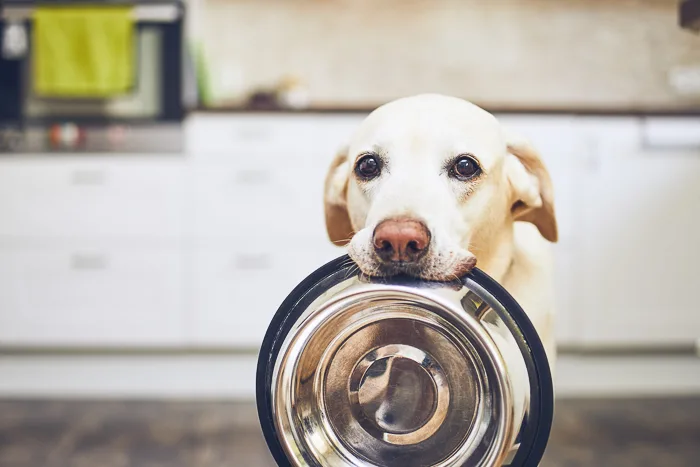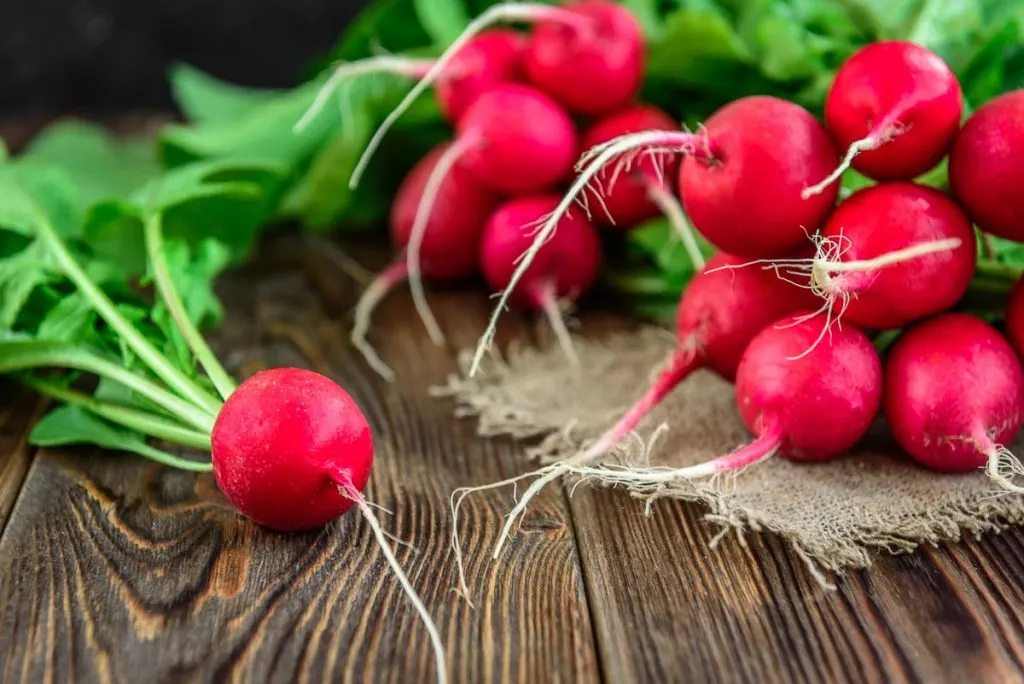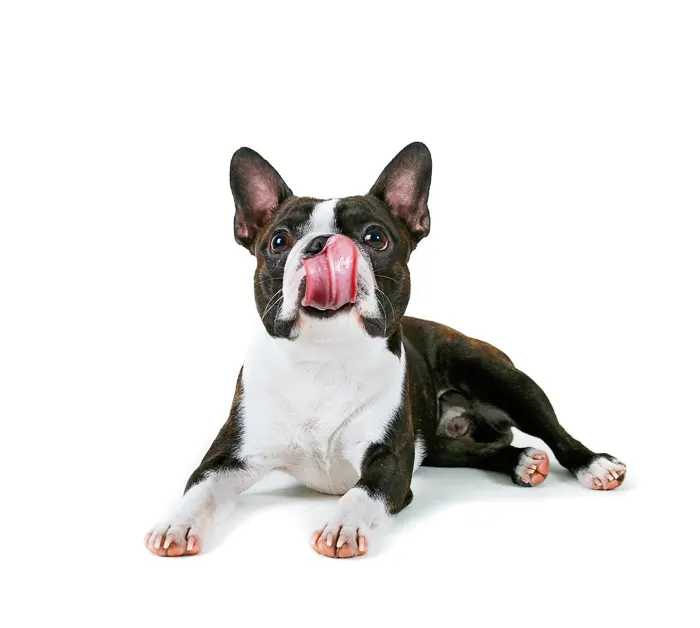Can your furry friend eat radishes and foods made from radishes? Simply put, we want to know – can dogs eat radishes? If you want to add a human food such as radishes to your dog's diet, read this article first!
Dr. Jess describes the risks and the benefits of feeding radishes to your dog, as well as which types of radishes dogs can eat (if any!), and which is best left out of their food dish.

Dog food experts have arguments regarding the safety of serving certain radishes to dogs.
Well, as delicious as radishes are, is it actually a health threat to the dogs or are we over-reacting about this?
Let me, the veterinarian, explain my thoughts…
It’s always the best idea to double-check which foods your dog can and can not eat because many foods that are safe and healthy for humans are actually very harmful for your dog to eat, or even poisonous or deadly to them. Taste is never worth the risk of harming your pet.
That's why I am so glad that you are here making an informed decision before feeding your dog radishes!
If you missed it, check out my article on if dogs can eat different forms of fish, mayo, or tuna fish!
What Do Dogs Eat?
Some dogs are not picky at all about what they eat. They’ll eat whatever you offer them- they're like vacuum cleaners sucking up anything you put in front of them and then some!
Some dogs are on the pickier side of things. Pickier pups can be harder to properly feed because they just won't eat any food we give them. Try feeding a picky dog something like okra!
A common canine diet for pet dogs consists of a complete dry or wet feed and possibly some form of supplements in some specific cases (however, not all pet dogs need supplements).
Foraging can also be included in the diet if the dog is allowed to roam, or the dog is feral, and of course there are treats that are a part of many dog's diets!
The diet of every dog breed will very when you are looking into a healthy and complete diet for your pup. So it is important to know when offering food to your dog, what constitutes a healthy choice, and what does not.
An improper diet could put your dog at risk of having problems properly digesting their food and absorbing nutrients correctly. And we don’t want that now do we???
So let’s talk specifically about radishes, since that's why you clicked over here today, and talk about how it could affect your dog’s overall health and well-being.

Let's Talk Radishes:
Radishes are a type of root vegetable that are pulled from the ground when harvested for food.
Radishes come in many different colors, shapes, and sizes.
Here in the United States, the popular radish is about the size of a golf ball, is round, and typically red. Other radishes take on a white/cream color or can be purple or black-looking as well.
Some radishes give off a light sweet taste, while others have a more unami or earthy-peppery flavor profile to them.
Radish Nutrition:
Radish have many well-known health benefits associated with them. But let's start with their nutritional profile. According to Wikipedia a radish contains:
“In a 100-gram (3 1⁄2-ounce) reference serving, raw radishes provide 66 kilojoules (16 kilocalories) of food energy and have a moderate amount of vitamin C (18% of Daily Value), with other essential nutrients in low content (table). A raw radish is 95% water, 3% carbohydrates, 1% protein, and has negligible fat.”
https://en.wikipedia.org/wiki/Radish
Good Source of Vitamin C:
Radishes have a nice amount of vitamin C in them – a vitamin that helps with the protection of important body systems that keep the body running and functioning appropriately.
Low in Calories:
Too many calories can lead to weight gain – that's a well known fact. So if you have an overweight pet, this treat may be a good option for you!
Contains Antioxidants:
Radishes are rich in antioxidants and minerals like calcium and potassium.
Put that all together and radish can help lower things like blood pressure – therefore decreasing some of the risks that predispose to heart disease and high blood pressure.
Helps Digestive Function:
Contains fiber to help aid in digestion.
Your pet needs a balanced amount of fiber in their diets to keep their gastrointestinal tract healthy and moving and digesting food appropriately.
May Lower Blood Sugar Levels
Radishes contain glucosinolate and isothiocyanate, chemicals that may help regulate blood sugar levels. This will come in handy if you have a diabetic pet!
Can You Feed Radishes To Dogs?
While radishes are not toxic to dogs and can be quite beneficial to some dogs, too much radish could lead to some health problems too.
Let me dive a little deeper and explain myself so you can make an informed decision on whether or not you should let fido eat radishes off of your plate.
Do Dogs Like Radishes?
Dogs are natural carnivores.
Some dogs find the flavor or crunch of radishes to be a delicious one, just some people love radishes in or on everything they eat, from their salads to their baked dinners.
So yes, some dogs like radishes. Some dogs even LOVE it.
Can Radishes Be Harmful to Dogs?
Before we can decide whether radish is safe to feed our dogs, we need to first understand some of the risks involved if we do feed our dogs radishes.
I am not saying that you shouldn’t have any concerns with feeding your dog radishes, because there are a few key things to keep in mind.
These three factors to keep in mind include:
Harmful Reason #1: Loose Stool/Diarrhea
Too much fiber can mean hypermotile, or increased movement, of one's digestive tract.
Some dogs are more sensitive to additional fiber in their diets, so they are more likely to have loose stool and in some cases, full-blown diarrhea.
Other dogs will not be impacted by any additional fiber in their diets.
It has also been talked about, that for some reason, some dogs have seen a dog's loose stool clear up and become more solid, after eating radishes.
Now, I have not seen this last scenario with my own eyes, I have had many people tell me that that was their experience.
Harmful Reason #2: Allergic Reaction to Radishes
A dog can develop an intolerance or an allergy to any food, so there is always the possibility that your dog is allergic to radishes.
If you suspect your dog is allergic to radishes do NOT feed this food to your dog.
If your dog is allergic to radishes and accidentally ingests it, go to your nearest animal emergency room immediately.
When this happens, the attack sets off a hypersensitivity reaction and can result in any of the following symptoms:
Common symptoms of adverse/allergic reaction to food:
- Nausea/vomiting
- Diarrhea
- Itching/Increased grooming
- Fever
- Lethargy
- etc.

How Much Radish Can Dogs Eat?
This depends on the specific dog in question. Most the time, radishes, given in small amounts periodically, are most likely just as healthy for your dog as it is for you.
Moderation is key here; never go overboard when feeding radishes to your dog, no matter if your dog has a stomach of steel or not. Small amounts every once in a while is okay for most dogs.
Smaller dogs do not need as much radish as a larger dog to have the same effect.
Dogs with loose stool do not need, or need much less radish, than a dog that is constipated would need.
The best thing to do to gauge how much radish you should be feeding your dog safely, would be to contact your veterinarian about the specific pet in question.
Are Radishes Beneficial For Dogs?
The random lick off of a radish or a small bite as a treat is totally fine – it will not harm your dog.
However, there’s no need to offer it in large quantities, as this can cause some major health issues for your pup, as I discussed above.
Basically, if your dog consumed a bit of radish, you don’t need to drive them straight to the vet to get their stomach pumped.
If they start showing any odd signs of being affected by this new food, contact your local veterinarian to get more information on what to do next.
So, yes there are some negative effects that can be seen with some dogs who consume radishes.
However, this does not mean that a large number of dogs see many more health benefits versus those few health concerns.
Some of the health benefits for dogs who consume radishes include:
- High Fiber: Fiber is great to keep the digestive system flowing smoothly and also helps dogs feel satiated (feeling full for longer after eating).
- Low Calorie: If your dog is overweight, you are liking looking for low calorie options for treats, etc.
- Water Content: A high water content vegetable means that your dog is more likely to stay well-hydrated.
- Low Fat: Again, if you are looking for lower-fat options to serve your overweight dog, radishes may be a good add-on option.
- Vitamins, Minerals, Antioxidants: A radish has many different vitamins, minerals, and antioxidants to help keep your dog happy and healthy.
Can Dogs Eat Raw Radishes?
Most dogs can handle a bit of raw radish.
Make sure that the radish is fresh and not overly ripe or rotten.
Some dogs do not like the taste of raw radishes, so don't be shocked if your pup tells you no thanks to raw radish.
Can Dogs Eat Roasted Radishes?
Yes, dogs can eat roasted radishes, as long as no seasonings or other cooking products were used in the cooking process.

How to Serve Radishes to Dogs:
After checking with your vet to make sure that radishes should be a part of your dog's menu, start by offering your dog 1 teaspoon worth of radish.
If your dog does not show any adverse reactions after 24 hours or more, then you are likely safe to continue feeding your pup radish, gradually increasing the amount according to your vet's guidelines.
Keep the following in mind when serving food to your dog:
And remember that dogs need more than a bowl or plate of radishes – they need a complete and balanced diet.
Whichever complete food you choose for your dog, it needs to have the AAFCO label indicating the diet is complete and balanced for your dog’s life stage.
AAFCO approved foods have gone through testing and compliance to make sure that the diet is safe and healthy for your pet.
Dogs already get everything that they need from their kibble or canned food.
How Much Radish Can My Dog Have?
Can dogs eat radishes? As I mentioned previously, it depends…
Most dogs are safe consuming a teaspoon or two of radish per serving.
I highly recommend contacting your vet first before starting your dog on radishes, and also suggest that you start by offering your pup a small amount of radish and then working up to a full amount.
A little bit of radish typically goes a long way!
It's always better to be safe than sorry!
Talk to your vet about the appropriate serving size of radish for your dog.
Can Puppies Eat Radishes?
I would never advise a puppy owner to feed radishes to their puppy unless your veterinarian is recommending it due to specific medical needs.
Why do I say this? Because your pup's first months of life should consist of specialized puppy diets approved by your local veterinarian upon puppy examination.
Puppies tend to have an even more delicate digestive system than adult dogs so giving your puppy radishes might cause diarrhea, vomiting, or other adverse reactions.
What to do If Your Dog Eats Radishes:
If it is just a lick or two of radish, just watch them for the rest of the day just in case, for any signs of adverse reaction.
If you are concerned with this small amount, of course, contact your veterinarian right away. Most dogs can tolerate a small amount of radish on occasion and do just fine.
If it is a large amount of radish, contact your veterinarian right away to discuss details and what to do next.
It is extremely likely that your vet will request that you bring your dog in immediately to get evaluated if they have gotten themselves into a large amount of radish, or a rotten radish. We vets want to help and we will best help if we are notified right away.
Trust me, us vets are happy to help!

The information provided in this article is not a substitute for professional veterinary help.
![[Vet Explains Pets]](https://vetexplainspets.com/wp-content/uploads/2024/09/cropped-vetlogo-199x66.png)

